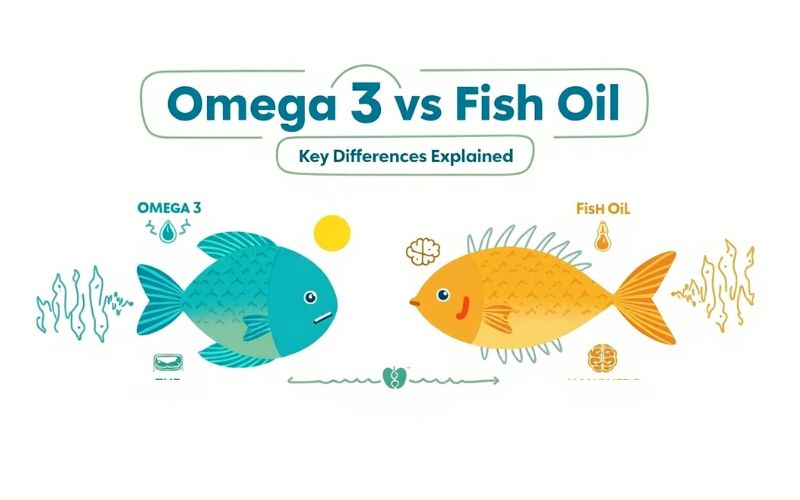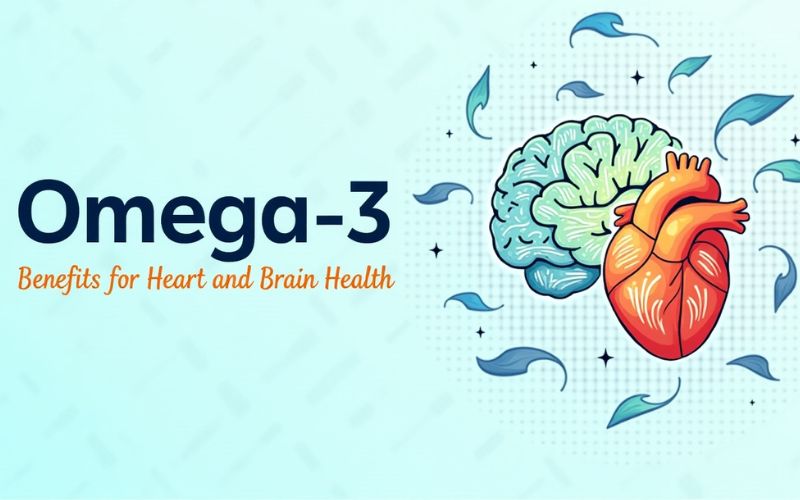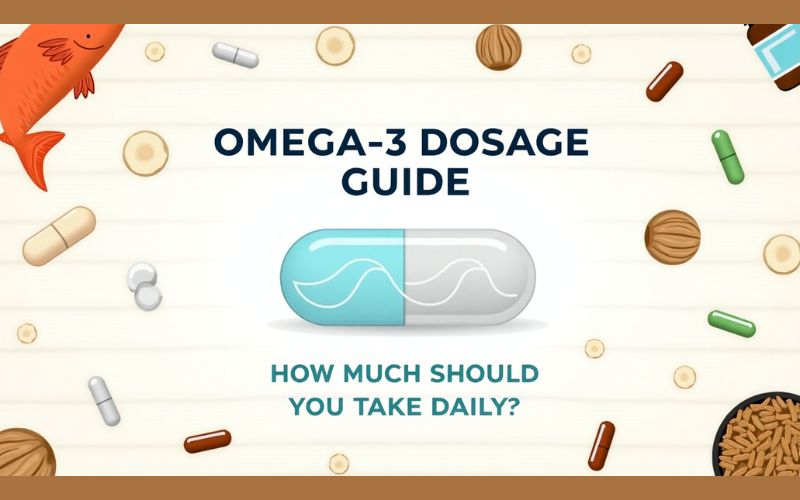Table of Contents
Introduction
Omega-3 fatty acids have gained significant attention in the medical world for their health-promoting benefits—especially for the heart. Found in fatty fish and certain plant oils, omega 3 is often recommended by cardiologists and dietitians as part of a heart-healthy lifestyle.
But the question remains: Is omega 3 good for heart health?
In this evidence-based guide, we’ll explore the science behind omega 3, its specific role in supporting cardiovascular function, ideal dosages, and who should or shouldn’t take it—all explained in simple terms backed by expert recommendations.
What Are Omega 3 Fatty Acids?
Omega 3 fatty acids are essential fats that the body cannot produce on its own, meaning they must be obtained from diet or supplements. The three most important types are:
- ALA (alpha-linolenic acid) – found in plant oils like flaxseed and walnuts
- EPA (eicosapentaenoic acid) – found in fatty fish
- DHA (docosahexaenoic acid) – also found in fatty fish and algae
EPA and DHA are especially important when it comes to heart health, due to their anti-inflammatory and lipid-lowering properties.
Common Sources of Omega 3:
- Fatty fish (salmon, sardines, mackerel, tuna)
- Flaxseeds and chia seeds
- Walnuts
- Fish oil and algae-based supplements
How Omega 3 Supports Heart Health
Extensive research shows that omega 3 has several beneficial effects on cardiovascular function. Here’s how it works:
? Reduces Triglycerides
High triglyceride levels are a major risk factor for heart disease. According to the American Heart Association (AHA), omega 3—especially EPA—can reduce triglyceride levels by 20–50%, depending on the dose.
? Lowers Blood Pressure
A 2022 meta-analysis published in Hypertension found that omega 3 intake lowered systolic and diastolic blood pressure in both hypertensive and normotensive adults.
? Prevents Plaque Build-Up
Omega 3 may slow the progression of atherosclerosis (hardening of the arteries) by inhibiting plaque formation and improving arterial elasticity.
? Improves Blood Vessel Function
DHA and EPA support the endothelium—the thin lining inside blood vessels—helping improve circulation and reduce inflammation.
? Anti-Inflammatory Effects on the Heart
Chronic inflammation contributes to heart disease. Omega 3 reduces the production of pro-inflammatory substances like cytokines, which benefits overall heart function.
These findings are backed by numerous clinical trials and are endorsed by leading institutions such as the National Institutes of Health (NIH) and World Health Organization (WHO).
Omega 3 for Heart Disease Prevention
Several large-scale studies, such as the GISSI-Prevenzione Trial and REDUCE-IT Trial, have shown that omega 3 fatty acids can significantly lower the risk of heart attacks, strokes, and cardiovascular death, particularly in individuals with existing heart conditions.
Guidelines from Global Authorities:
- AHA recommends omega 3 (1 gram/day of EPA + DHA) for individuals with heart disease.
- WHO advises regular omega 3 intake through diet or supplements for prevention of cardiovascular diseases.
These recommendations confirm that omega 3 and heart disease prevention go hand in hand.
Ideal Omega 3 Dosage for Heart Health
? General Recommendation:
- 500–1,000 mg/day of EPA + DHA for healthy adults
- 2,000–4,000 mg/day under medical supervision for high triglycerides
? Supplement Considerations:
- Check EPA/DHA content per capsule—not just “fish oil” amount
- Choose third-party tested products for purity (e.g., IFOS, USP)
Always consult a doctor before exceeding 3 grams/day of omega 3, especially if on medications.
Best Sources of Omega 3 for Heart Health
? Fatty Fish:
- Salmon, sardines, mackerel, and herring are rich in EPA and DHA.
? Supplements:
- Fish oil (most common)
- Krill oil (more absorbable, but pricier)
- Algae oil (vegan-friendly and high in DHA)
✅ Choosing the Best Omega 3 Supplement:
- Check for purity certifications
- Look for high EPA/DHA content
- Choose triglyceride form over ethyl ester (for better absorption)
A good supplement will support heart health without harmful additives.
Who Should Be Cautious with Omega 3?
While generally safe, omega 3 isn’t suitable for everyone.
⚠️ Blood Thinner Users
Omega 3 has a natural blood-thinning effect. Those on warfarin, aspirin, or other anticoagulants should consult a doctor to avoid excessive bleeding risks.
⚠️ People with Fish or Shellfish Allergies
Fish oil supplements may trigger allergic reactions. Algae-based options are safer for these individuals.
⚠️ Pre-surgery Patients
High doses of omega 3 should be discontinued 1–2 weeks before surgery to reduce bleeding risk.
⚠️ People with Certain Digestive Conditions
Some may experience nausea, diarrhea, or fishy burps—especially with low-quality products.
Frequently Asked Questions (FAQ)
❓ Can omega 3 help with high cholesterol?
Yes. Omega 3 primarily reduces triglycerides but may also increase HDL (good cholesterol). However, it may slightly raise LDL in some people.
❓ Is fish oil safe to take every day?
Yes, daily intake of high-quality fish oil is generally safe in moderate doses (1–2 grams). Monitor dosage with your doctor.
❓ Are plant-based omega 3s effective for heart health?
ALA from plants is less efficiently converted to EPA/DHA, but it still offers cardiovascular benefits. Algae oil is the best plant-based alternative for EPA/DHA.
Conclusion: Is Omega 3 Good for Heart Health?
Yes—omega 3 is scientifically proven to support heart health. From lowering triglycerides and blood pressure to reducing the risk of heart disease, EPA and DHA have demonstrated multiple cardiovascular benefits.
But omega 3 isn’t a one-size-fits-all solution. Dosage, source, and personal health conditions matter. For best results, combine omega 3 intake with a heart-healthy diet, exercise, and regular check-ups.
Always consult your physician or a certified dietitian before starting any supplement, especially if you have existing medical conditions or take medications.


























